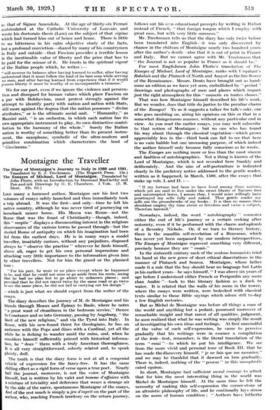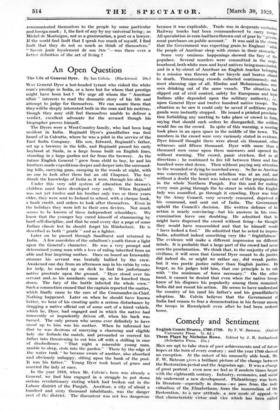Montaigne the Traveller The Diary of Montaigne's Journey to Italy
in 1580 and 1581. Translated by E. J. Trechmann. (The Hogarth P11388. 15s.)
lams many a harassed author, Montaigne saw his first two volumes of essays safely launched and then immediately took a trip abroad. It was the first—and only—time he left his native country, although he was never tired of journeying on horseback nearer home. His Mecca was Rome—not the Rome that was the fount of Christianity—though, indeed, this " sceptic " displays a disconcerting interest in the religious observances of the various towns he passed through—but the storied Rome of antiquity on which his imagination had been fed from the earliest days. He is in many ways a model traveller, insatiably curious, without any prejudices, disposed always to " observe the practice " wherever he finds himself, above all, eager to get his own personal impressions and attaching very little importance to the information given him by other travellers. Not for him the grand or the planned tour :
" For his part, he went to no place except where he happened to be, and that he could not miss or go aside from his route, seeing that he had no plan but to go about to unknown places ; and provided that he did not travel twice by the same road or go twice to see the same place, he did not fail in carrying out his design "
—which is just what we should expect from the writer of the essays.
The diary describes the journey of M. de Montaigne and his friends through Meaux and gpinay to Bask; where he notes " a great want of cleanliness in the bedroom service," thence to Constance and so into Germany, passing by Augsburg, " the limit of the new religions," and via the Tyrol into Italy. In Rome, with his new-found thirst for theologians, he has an
audience with the Pope and dines with a Cardinal, yet all the while he is itching to wander amid the ruins, and, when he considers himself sufficiently primed with historical informa- tion, he " does " them with a truly American thoroughness. It is all very straightforward, soberly related and, to speak plainly, dull.
The truth is that the diary form is not at all a congenial vehicle of expression for the fancy-free. It has the same chilling effect as a rigid form of verse upon a true poet. Nearly
half the journal, moreover, is not the voice of Montaigne himself, but is written by his valet and homme d'affaires with
a mixture of triviality and deference that wears a strange air
by the side of the naive, spontaneous Montaigne of the essays. And of the rest much is simply a fru d'esprit on the part of the author, who, reaching French territory on the return journey,
follows out his own educational precepts by writing in Italian instead of French, " that foreign tongue which I employ with great ease, but with very little sureness."
Mr. Trechmann tells us that the diary has only twice before been translated into English—it was only discovered by chance in the chateau of Montaigne nearly two hundred years after the author's death—also that it is out of print in France and Italy. But we cannot agree with Mr. Trechmann that the Journal is not so popular in France as it should be."
For most Englishmen John Florio's translation of 7'he Essayes of Michael, Lord of Montaigne, ranks with Urquhart's Rabelais and the Plutarch of North and Amyot as the fine flower of the Renaissance. Messrs. Dents have brought out as hand- some an edition as we have yet seen, embellished by period "
drawings and photographs of men and places which impart just the right atmosphere for this causerie en toutes choses." That was how Montaigne himself described his life's work.
But we wonder, does that title do justice to the peculiar charm of the Essayes? To us it suggests a talker for talk's sake, one who goes rambling on, airing his opinions on this or that in a somewhat disingenuous manner, without any particular end in
view. As you read the earlier essays, you may well subscribe to that notion of Montaigne ; but no one who has found his way about through the classical vegetation—which grows appreciably less in the—third book can fail to see that here is no vain babble but one unceasing purpose, of which indeed the author himself only became fully conscious as he wrote.
The Essayes are nothing more or less than the most sincere and faultless of autobiographies. Not a thing is known of the
Lord of Montaigne, which is not revealed here frankly and deliberately. And the aim of self-portraiture is indicated clearly in the prefatory notice addressed to the gentle reader, written as it happened, in March, 1580, after the essays that make up vols. I. and II. :—
" If my fortune had been to have lived among those nations, which yet are said to live under the sweet liberty of Natures first and uncorrupted laves, I assure thee, I would most willingly have pourtrayed my selfe fully and naked. Thus gentle reader my selfe am the groundworke of my books : It is then no reason thou shouldest employ thy time about so frivolous and vaine a subject. Therefore farewell."
Nowadays, indeed, the word " autobiography - connotes
either the end of life's journey or a certain seeking after notoriety, even if it be performed with the charm and aplomb of a Beverley Nichols. Or, if we turn to literary history,
there is the maudlin self-revelation of a Rousseau, which has never yet been surpassed by our modern introspectives. The Essayes of Montaigne represent something very different, precisely because they are " essais."
In the sixteenth century each of the zealous humanists tried his hand at the new genre of short ethical dissertations in the manner of Plutarch and Seneca. Montaigne, whose father made it a rule that the boy should hear no language but Latin in his earliest years—he says himself, " I was above six years of
age before I understood either French or Perigordin any more than Arabic "—took to this literary fashion as a duck to water. It is related that the walls of his room in the tower, where the essays were written, were bedecked with classical texts similar to those Bible sayings which adorn still to-day a few English rectories.
But as Michel de Montaigne was before all things a man of the world and anything but a pedant, possessed moreover of remarkable insight and that rarest of all qualities, judgment,
he soon realized that what he was writing was simply the result
of investigating his own ideas and feelings. At first unmindful of the value of such self-expression, he came to perceive
gradually that his writings were in essence a compilation of the tests—test, remember, is the literal translation of the term " essai "—to which he put his intelligence. We see from the more vivid and personal tone of Book III. that he has made the discovery himself, " je ne fais que me raconter," and we may be thankful that it dawned on him gradually. There is, indeed, nothing of the " poseur " in this unsophisti- cated egoism.
In short, Montaigne had sufficient moral courage to admit that for him the most interesting thing in the world was Michel de Montaigne himself. At the same time he felt the necessity of making this self-expression the corner-stone of an altruistic philosophy of life, and he continually lays stress on the norm of human condition : " Authors have hitherto
communicated themselves to the people by some particular fend foreign mark ; I, the first of any by my universal being ; as Michel de Montaigne, not as a grammarian, a poet or a lawyer. If the world fmd fault that I speak too much of myself, I find fault that they do not so much as think of themselves." " Savoir jouir loyalement de son Rre "—was there ever a better definition of the art of living ?



















































 Previous page
Previous page